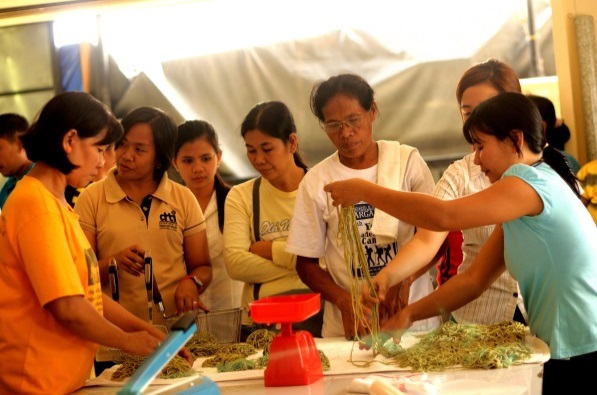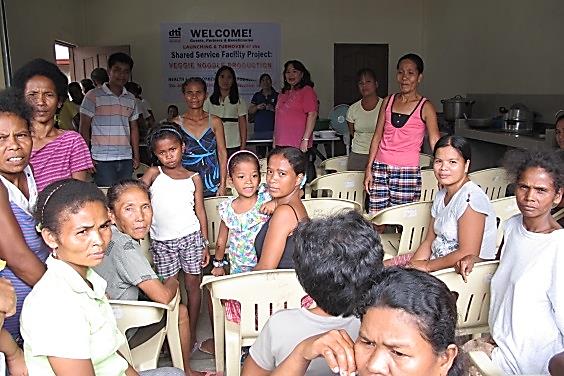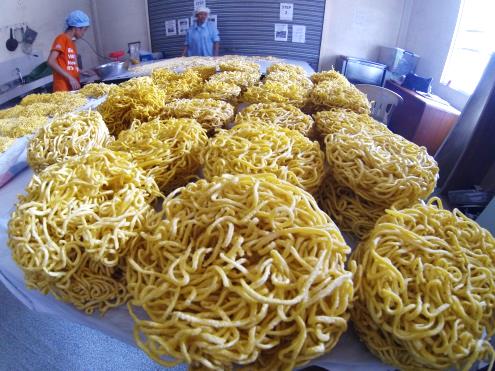Sta. Juliana and its neighboring barangays, namely, Sta. Lucia, Cristo Rey, Patling, and Bueno, were known to be the haven of the New People’s Army in the past. Back then, people were afraid to roam the streets for fear of being killed during crossfires between the government forces and the insurgents. It was also during those times when little assistance, if not none at all, was extended to the community because government assistance was always hampered by the said circumstances.
Sta. Juliana is the farthest barangay in the western portion of the municipality of Capas, Tarlac and is also the poorest. It has a significant population of Aetas, one of the indigenous tribes in the Philippines. Despite economic progress, development has left behind the Aeta communities in the upland and lowland areas. Most of them have no electricity, no good water system and no health facilities. They have a primary school but they have no full-time teachers, thus, the educational level of the Aeta children is still very low. Farming is the dominant occupation of the Aetas and the non-Aetas in the area.
Program Magarita was conceived when a group of medical professionals, headed by Dr. Ricardo P. Ramos, the present Provincial Health Officer II of the Tarlac Provincial Hospital, shared a simple desire to help bring basic health services to the Aeta communities in the upland areas. It was named Program Margarita because it was conceptualized while these doctors were on a drinking gathering of a beverage of the same name. It was in one of their medical missions when they saw the sad plight of the Aetas. Many Aeta mothers just die while giving birth because there were no pre-and post-natal care and birthing centers in the area. A simple illness could almost always lead to the death of many children because of the non-availability of medical services.
In December of 1994, Program Margarita was officially registered with the Securities & Exchange Commission under the Health For All Foundation, Inc. as a faith-based non-government organization. In January 2012, it was amended to Health And Development For All Foundation, Inc. (HADFAFI) to cover the different units that were added. These additions are the Health, Nutrition and Hygiene Unit, the Education Unit, and the Sustainable Development Unit.

Since 2005, HADFAFI has been implementing the child-sponsorship program which has benefitted more than 2,000 families in Tarlac and 600 families in Marikina City. Every month, HADFAFI provide food baskets consisting of rice, noodles and canned goods to each sponsored family. In 2013, HADFAFI stopped the inclusion of instant noodles and instead replaced it with other healthier and nutritious items.
In 2011, Program Margarita requested DTI, under its Comprehensive Agrarian Reform Program livelihood component, for a skills training on veggie noodle making. DTI also provided the group with a portable noodle machine so they could start their production right after the said training. They started promoting their noodles in hospitals and in government offices in Tarlac.
Nevertheless, the veggie noodle project started slow because they still had to look for a site of their would-be production center. They only produced veggie noodles when there were requests or whenever they had gatherings. It was during these idle times when the workers were given Good Manufacturing Practices and other food-related seminars, in preparation for them going to mass production.

Their eagerness to produce intensified when DTI offered them the Shared Service Facility Program where they were given machines and equipment like the noodle kneader and cutter with a 25-75 kg. capacity, a dough mixer, a special high-quality deep fryer, a heavy-duty blender, and a weighing scale with printer.
Since farming is the dominant source of livelihood among the Aetas in the upland areas, the supply of vegetables for their veggie project was never a problem. Some of the vegetables and crops that they regularly plant are sweet potatoes, squash, malunggay, and saluyot. These are alternately added to the veggie noodles which they produce.
At present, HADFAFI has a production staff of 10 and another 10 handling admin-related matters. They are now producing at least 90-120 pcs. of 250g packs of veggie noodles every day for its monthly food basket requirements for its 1,100 sponsored-families in Tarlac and 600 in Marikina City. The group also started using some of the veggie noodles for its feeding program as part of its summer and regular day-care classes.

With the assistance provided by DTI, through its CARP and SSF Programs, the community now feels the presence of the Government. HADFAFI’s veggie noodle project is a clear indication that, with the consolidated efforts of the Government, the community, and the private sector, a healthier and peaceful society can be accomplished.
Meanwhile, for their expansion plans, HADFAFI already had initial talks with the Philippine Air Force, the DSWD Capas, and to some suppliers of pasalubong centers. The Foundation also plans to tap its network of religious organizations, seminaries, parishes, social action centers and the like.♦


